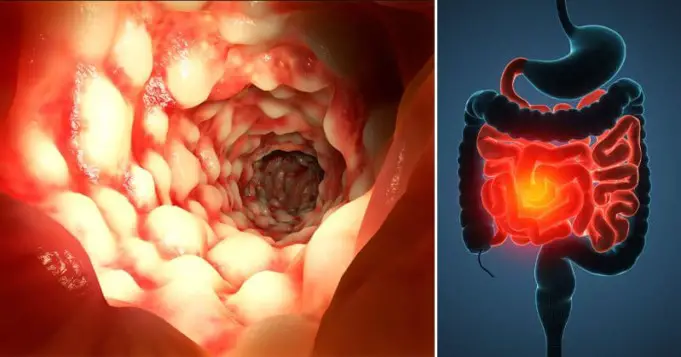Ulcerative colitis occurs when there is a severe inflammation of the colon, a part of the large intestine. The colon is a part of the digestive system and it has 3 parts: the ascending colon, the descending colon and the transverse colon. If there is an inflammation in any part of the colon, then ulcerative colitis occurs.
Ulcerative colitis is also related closely to Crohn’s disease which is the inflammation of the intestine. Most times, ulcerative colitis occurs alongside Crohn’s disease and when they occur together, they are known as inflammatory bowel disease (IBD). Both of these diseases are very chronic conditions which need urgent medical help.
Ulcerative colitis affects both men and women equally with no higher rating in either of both sexes. It affects the inner lining of the colon. Normally, ulcerative colitis mostly starts in early adulthood or adolescence and continue till adulthood. However, in some rare cases, ulcerative colitis begins in childhood and continues till adulthood.
The exact cause of this disease is not known. However, doctors suspect that this disease may be as a result of immune system malfunction. The normal function of the immune system is to fight off bacterial, virus, germs and any other foreign body that attacks the body.
However, sometimes, the immune system might abnormally malfunction hence causing the immune system recognise cells of the digestive system as a foreign object and therefore attacking it.
Heredity has also been discovered to play a huge role in the development of this disease. This means that if you have a family member who was once diagnosed of having ulcerative colitis, then there is a huge tendency that you may also develop this disease as well.
This inflammation however causes swelling through most of the large intestine and it also causes ulcer sores throughout the entire digestive tract.
Symptoms of this disease develops over a long period of time and it doesn’t necessarily come on as a sudden problem. This means that for those who are experiencing symptoms of this kind of ulcer, you probably have had it for awhile without you knowing.
These ulcers can be very serious leading sometimes to very serious and life threatening life complications. Since it has no known cause, it also has no known cure. However, treatment can cause relief from the symptoms and even give you long term remission.
Symptoms of ulcerative colitis
The symptoms of this disease can vary depending on the extent of the inflammation, how severe it is and the site at which it occurs. However, anyone who has ulcerative colitis will experience the following symptoms:
- Diarrhoea alongside with traces or spots of blood. For others, it may not be blood, but pus. If you see this occurring, then you have ulcerative colitis
- Severe abdominal pain and cramps.
- Pain around the rectal region
- Urgency to always defecate
- Despite how urgent you felt like defeating, however you may also experience inability to defecate.
- Severe weight loss due to the inability of nutrient absorption.
- Severe tiredness and fatigue.
- Intense fever.
- For kids, they may experience stunted growth (I.e the inability to grow)
There are five different type of colitis that have been seen to have to affect patients. Doctors have classified these different ulcerative colitis based on where they are found to have originally occurred.
1. Ulcerative proctitis
This kind of ulcer cause inflammation that is only found around the rectum area. The only symptom of this disease could only be rectal bleeding. Among all the type of ulcerative cancers, this is the mildest of them all.
2. Proctosigmoiditis
This kind of ulcer causes inflammation within the rectum and the sigmoid colon. The sigmoid colon is the lower end of the colon that is found just next to the rectum.
Signs of this kind of ulcer include watery stools along with spots of blood, severe abdominal pains and cramps, and the person will experience the inability to move the bowels adequately. This condition is known as Tenesmus.
3. Left-sided colitis
This kind of ulcer causes inflammation that extends from the sigmoid colon to the descending colon. Signs of this disease includes bloody diarrhoea, severe abdominal cramps, severe pains on the left side of the abdomen. Also the patient will most likely experience unintended weight loss.
4. Pancolitis
This kind of ulcer is so severe such that it affects the entire length of the colon. The patient will experience intense and severe bouts of diarrhoea, intense abdominal cramps, severe tiredness, as well as significant weight loss.
5. Acute severe ulcerative colitis
This kind of ulcer is actually quite rare and it affects the entire colon. It causes severe pains and this pains will be felt all around the entire regions where the colon is found. Asides the pains, the patient will also experience diarrhoea, profuse bleeding, high fever, and also the inability to eat hence the significant weight loss.
There are some possible complications that could as a result of long-term ulcerative colitis and they include:
- Severe and intense bleeding.
- Perforated colon (a hole in the colon)
- Severe dehydration
- Liver disease and rarely liver failures.
- Osteoporosis (bone disease)
- Inflammation found in the skin, the joints and the cornea of the eyes.
- Increased risk of colon cancer.
- An increasingly rapidly swelling colon cancer.
- High risk of blood clots within the arteries or veins.
If you are experiencing any of the aforementioned symptoms, Endeavour to visit your doctor for adequate body check up.












